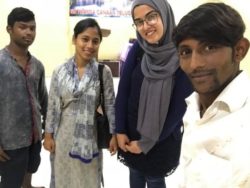My experience of conducting research in Bangladesh

Mariam Zaqout, Graduate, Master of Science in Water, Sanitation and Health Engineering.
*This post is about research conducted as part of a Master of Science in Water, Sanitation and Health Engineering final project, supervised by Dr Sally Cawood*
As part of my MSc in Water, Sanitation and Health Engineering at the University of Leeds, I travelled to Bangladesh for three weeks to collect data for my project; ‘Informal sanitation jobs: the prospects of enhancing the status of pit emptying workers in Bangladesh’. I had the chance to interview people working in the sanitation sector; more specifically, pit-emptiers, known as ‘sweepers’, and people who cooperate with them, in three cities: Dhaka, Faridpur and Khulna. I had never imagined myself visiting Bangladesh, and I did not really know much about the nation except their misery when working in the Arab Gulf, and my professors’ experiences back there. Thus, it was a unique experience for me on both an academic and personal levels.
 Since it was my first experience as a lead researcher, I had many worries regarding the language barrier, the people’s culture, and their expectations, as I am neither Western nor south Asian; an ‘Uppa’ (‘sister’) visiting the country for research! I mean, what are the chances of meeting a young lady from a troubled city such as Gaza, Palestine, in the middle of Dhaka? Surprisingly, they were delighted to have me. They received me with compassion, hugs, great food (I fell in love with the dairy sweets), prayers and wishes for my country’s freedom. They were curious to know more about me and my country, which was a great aid to building trust and rapport with the participants; once, at the end of an interview, I asked the participant if he wished to ask anything J. Guess what, he asked about my nationality and the reason behind choosing Bangladesh (he had nothing to ask about sanitation, haha!). They gave me the sense of belonging; even for three weeks, I did not need to present myself and my culture, I was told repeatedly that I can live in Bangladesh if my city is too dangerous. One Christian guy insisted on showing me their local church as my name is Mariam ‘the Arabic name of Jesus’s mother,’ and I come from the land of Jesus; some ladies admired my Hijab so much that I felt bashful. In general, a very compassionate and hospitable nation and I cannot wait to go back.
Since it was my first experience as a lead researcher, I had many worries regarding the language barrier, the people’s culture, and their expectations, as I am neither Western nor south Asian; an ‘Uppa’ (‘sister’) visiting the country for research! I mean, what are the chances of meeting a young lady from a troubled city such as Gaza, Palestine, in the middle of Dhaka? Surprisingly, they were delighted to have me. They received me with compassion, hugs, great food (I fell in love with the dairy sweets), prayers and wishes for my country’s freedom. They were curious to know more about me and my country, which was a great aid to building trust and rapport with the participants; once, at the end of an interview, I asked the participant if he wished to ask anything J. Guess what, he asked about my nationality and the reason behind choosing Bangladesh (he had nothing to ask about sanitation, haha!). They gave me the sense of belonging; even for three weeks, I did not need to present myself and my culture, I was told repeatedly that I can live in Bangladesh if my city is too dangerous. One Christian guy insisted on showing me their local church as my name is Mariam ‘the Arabic name of Jesus’s mother,’ and I come from the land of Jesus; some ladies admired my Hijab so much that I felt bashful. In general, a very compassionate and hospitable nation and I cannot wait to go back.
Back to my research topic, it was relatively easy to recruit participants and set appointments, thanks to my supervisor, who had worked previously in Bangladesh, and my local research assistant, who was familiar with the nature of my research. In most of the cases, it was unpredictably easy to address to the topic even though it is a social taboo; apparently the workers are comfortable to talk about it and especially those who work in the cooperatives, as they became aware of the importance of their jobs. However, one of the interviewees found it useless to speak as I could not offer support and he is not really satisfied with the fact that his forefathers used to hire Hindus to do this dirty job but now he, ‘Bengali,’ must do this job due to harsh financial conditions.
One of the interesting reflections from the field was the dynamics between some representatives of the governmental organisations and the two cooperatives. One governmental employee was enthusiastic about the ‘Muslim group’; he started to explain how disciplined and achieving it is, while he was the extreme opposite when he talked about the ‘Harijan group’. To be fair, he complimented their will to become better people! Yes, the Harijan had, and maybe still have, alcohol consumption issues while performing their work, but this does not justify negatively perceiving them, their job is not a normal one, it takes a lot of effort to accept it, especially if you have to do it manually (dive in the SHIT, literally). That person was not the only one who disappointed me with his attitude. One GOVERNMENTAL EMPLOYEE who, as he explained, has many higher education degrees, explained proudly that his institution does not impose penalties against the pit-emptiers as they are “uneducated and poor people”. He also strongly believes that they should work at night only, so they do not disturb the public with their bad smell and appearance.
